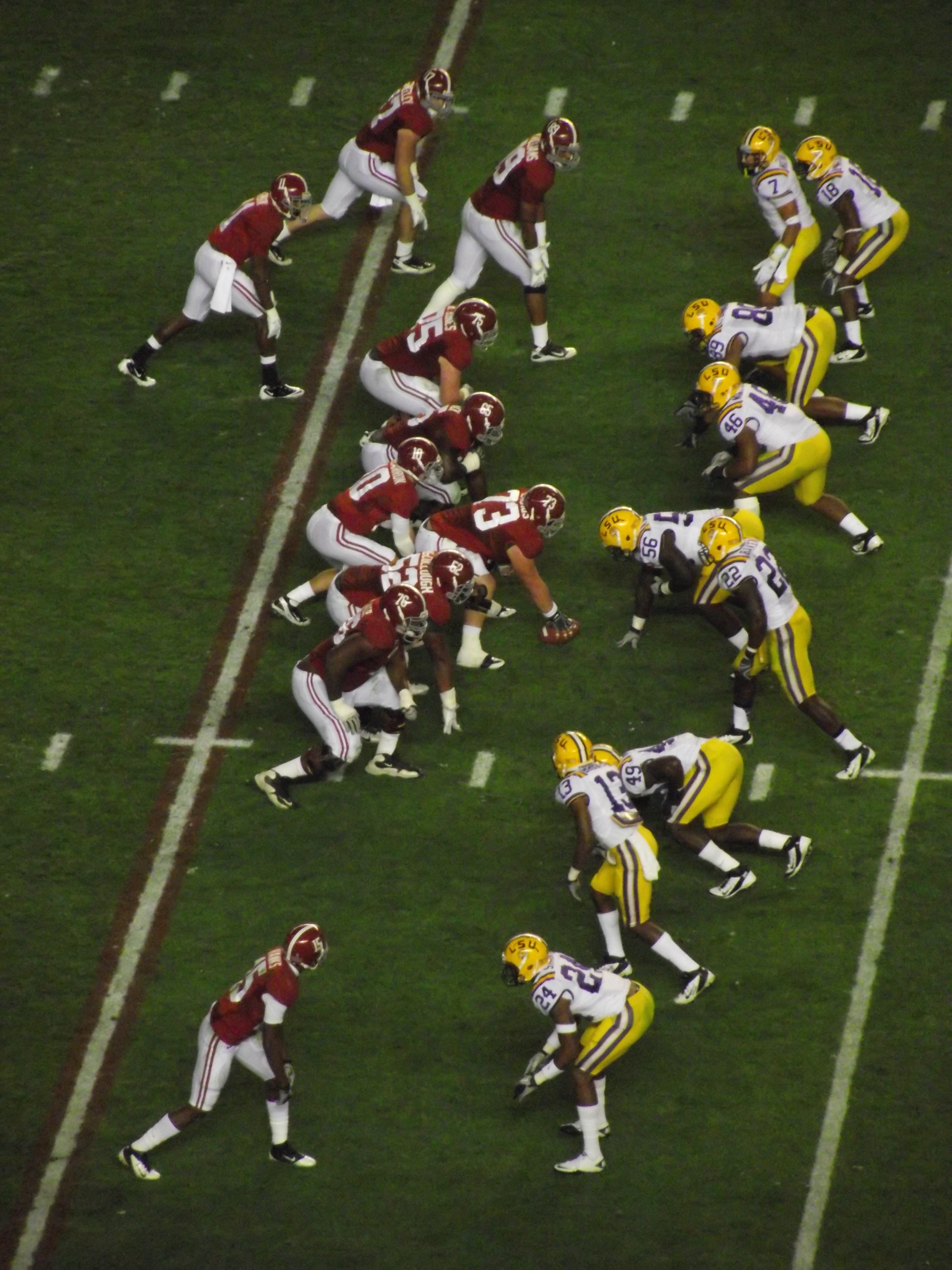
2011 NCAA Division I FBS football season
The 2011 NCAA Division I FBS football season was the highest level of college football competition in the United States organized by the National Collegiate Athletic Association (NCAA).
2011 NCAA Division I FBS season
120
September 1 – December 10
December 17, 2011 – January 9, 2012
35
The regular season began on September 1, 2011 and ended on December 10, 2011. The postseason concluded on January 9, 2012 with the BCS National Championship Game at the Mercedes-Benz Superdome in New Orleans. The No. 2 Alabama Crimson Tide defeated the No. 1 LSU Tigers 21–0. For the first time since 2007, and for only the third time in the Bowl Championship Series era, no team from an automatic-qualifying BCS conference finished the season with an undefeated record.
Infractions, investigations, and scandals[edit]
Ohio State[edit]
Five Ohio State players were alleged to have improperly traded dozens of items to the owner of a tattoo parlor in exchange for tattoos, cash, and, in one case, a sport-utility vehicle. The players, along with head coach Jim Tressel, were suspended for the first five games of the 2011 season. Tressel was under investigation for lying to the university and investigators regarding his knowledge of the incident.[23] The program was also under investigation by the NCAA, the school having going before the NCAA Committee on Infractions in August 2011, with findings and decisions following shortly thereafter.[24] The scandal led to the resignation of Tressel on May 30.[25] On June 8, starting quarterback Terrelle Pryor, one of the five suspended players, announced that he would forgo his final year of college eligibility.[26]
Initially, Ohio State offered to vacate its entire 2010 season, return money received from the 2011 Sugar Bowl, impose two years of probation, and use five fewer football scholarships over the next three seasons. However, after the school went before the NCAA, further rules violations emerged. Three players were suspended before the start of the season for receiving $200 from a booster. Then, midway through the season, it was discovered that the same booster had overpaid several players for summer jobs.
The NCAA announced its final penalties on December 20. While accepting Ohio State's initial self-imposed penalties, it levied additional sanctions. One extra year of probation and scholarship reductions was added, running through the 2014 season. The Buckeyes will also be banned from postseason play in 2012. Tressel, who joined the staff of the Indianapolis Colts during the 2011 NFL season and has since taken a non-athletic position at his alma mater of the University of Akron, was hit with a five-year show-cause penalty, which effectively bars him from college coaching through the 2016 season. Finally, the school was required to disassociate itself from Pryor for five years.[27]
North Carolina[edit]
The North Carolina Tar Heels, in the midst of an NCAA investigation into improper benefits and academic misconduct within the football program, fired head coach Butch Davis on July 27.[28]
The school initially vacated its 2008 and 2009 seasons, reduced its scholarship allotment by nine over the next three seasons, and self-imposed two years of probation. Although the NCAA praised the university for its investigation, it found several aggravating factors. The NCAA confirmed academic fraud, found that players had received at least $31,000 in impermissible benefits, determined that six players had played while ineligible, and also found evidence of rampant agent involvement in the program. The NCAA added an extra year of probation, and also banned the Tar Heels from the 2012 postseason. John Blake, an assistant who had been forced out with Davis, was found to have received personal loans from agent Gary Wichard that he did not report to UNC, specifically for access to players. He was also cited for not cooperating with investigators. Blake received a three-year show-cause penalty.[29]
Rankings reflect the AP Poll. Rankings for Week 8 and beyond will list BCS Rankings first and AP Poll second. Teams that failed to be a top 10 team for one poll or the other will be noted.
Awards and honors[edit]
Heisman Trophy voting[edit]
The Heisman Trophy is given to the year's most outstanding player
Coaching changes[edit]
Preseason and in-season[edit]
This is restricted to coaching changes that took place on or after May 1, 2011. For coaching changes that occurred earlier in 2011, see 2010 NCAA Division I FBS end-of-season coaching changes.